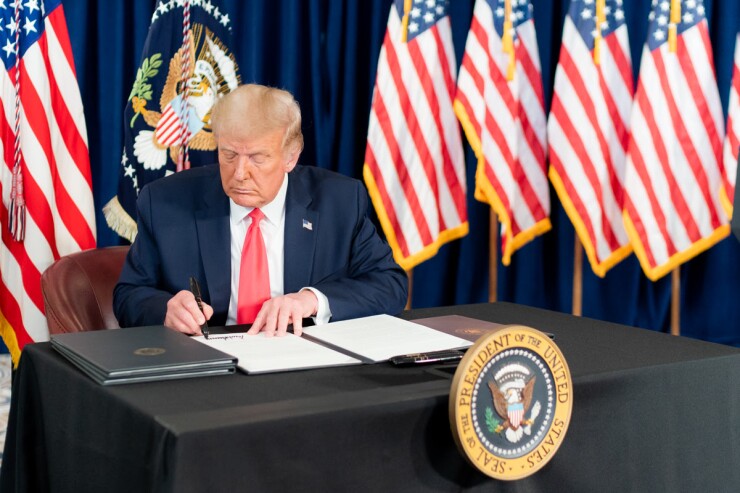The U.S. Chamber of Commerce and over 30 business and trade organizations sounded the alarm in a
The business groups are urging Congress and the Trump administration to work together on a way to provide tax relief to American families without imposing a big tax bill on them in the future under the executive order.
“Under current law, the EO creates a substantial tax liability for employees at the end of the deferral period,” said the letter. “Without Congressional action to forgive this liability, it threatens to impose serious hardships on employees who will face a large tax bill as a result of deferral.”
Trump signed the memorandum earlier this month after negotiations broke down over a new stimulus package to help the economy recover from the novel coronavirus pandemic. Mnuchin and White House Chief of Staff Mark Meadows failed to reach an agreement with House Speaker Nancy Pelosi, D-Calif., and Senate Minority Leader Chuck Schumer, D-N.Y., and Trump issued a series of executive orders and memoranda on unemployment benefits, an eviction moratorium, student loan debt, and payroll tax deferral.

The payroll tax memorandum only addresses the 6.2 percent employee’s share of Social Security taxes but doesn’t apply to the 1.45 percent employee’s share of Medicare taxes, according to a
To show the huge impact of the potential tax bill taxpayers would face compared to a more immediate benefit of deferral, the U.S. Chamber
| Income | Bi-weekly pay | Increase per pay period | Tax bill due in 2021 (based on 9 pay periods) |
| $35,000 | $1,346.15 | $83.46 | $ 751.15 |
| $50,000 | $1,923.08 | $119.23 | $1,073.08 |
| $75,000 | $2,884.62 | $178.85 | $1,609.62 |
| $104,000 | $4,000.00 | $248.00 | $ 2,232.00 |
“Many of our members consider it unfair to employees to make a decision that would force a big tax bill on them next year,” said the letter from the U.S. Chamber of Commerce and other powerful business groups including the National Association of Manufacturers, the National Association of Realtors and the National Retail Federation, to Mnuchin, Pelosi and Senate Majority Leader Mitch McConnell, R-Ken. “It would also be unworkable to implement a system where employees make this decision. Therefore, many of our members will likely decline to implement deferral, choosing instead to continue to withhold and remit to the government the payroll taxes required by law. We hope Congress and the Administration come together on a path that supports workers instead of burdening hardworking Americans with a large tax bill next year.”
“We’ve not seen any specific guidance on this yet from Treasury,” said Tim Speiss, co-leader of Top 100 firm EisnerAmper's Personal Wealth Advisors Group. “There’s supposed to be guidance on the order, and then also if there’s going to be any ways where the tax could be forgiven through future legislation. Right now, we’re only talking about deferring the tax, and it may well have to be paid at a later date.”
Trump and Mnuchin have predicted that the payroll taxes would be forgiven in future legislation next year, but that would depend on who is control of Congress and the White House after the November election. Right now, the payroll tax deferral has little support from either Democrats or Republicans in Congress.
Some workers and employers may decide not to have the payroll taxes deferred to avoid problems next year. “It really depends upon the average compensation of the workforce and how many are in the workforce, so there are some factors to consider,” said Speiss.





